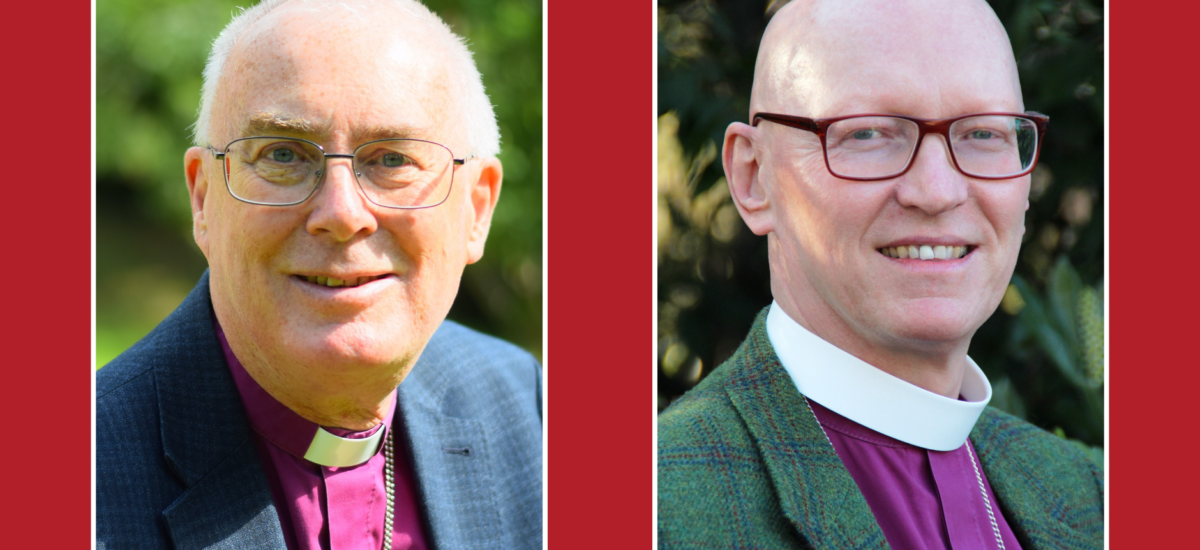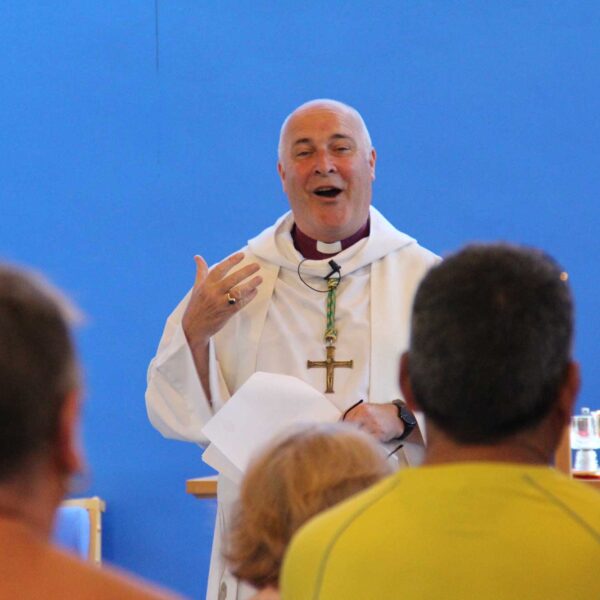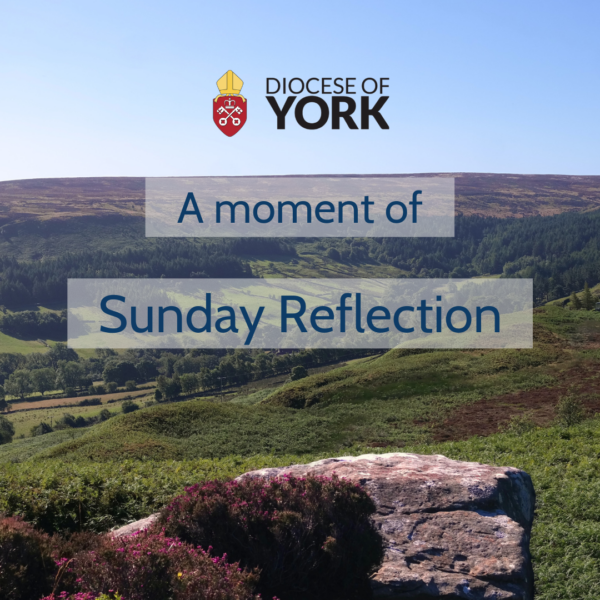The Bishops of Whitby and Selby, Paul Ferguson and Dr John Thomson, were invited by the Archbishop of York at this week’s Chrism Service in York Minster to give their own reflections on Christian Ministry as they both approach retirement in July.
Here’s what they said:
The Bishop of Whitby, the Rt Revd Paul Ferguson:
A long time ago I worked in a church where we had informal Sunday evening services. There was a young woman who often came to them. We both moved on. It so happened that almost 20 years later we found ourselves in contact again. ‘Thanks for the services.’ ‘How are things?’ ‘Fine. It’s been a long time (she said), but I can pray now.’
I can pray now — with four words she taught me so much about ministry. It’s a privilege to be part of someone’s faith journey: but there’s no programme, no timetable. As ministers we can encourage, we can set the scene perhaps, but neither from a divine or human point of view are we in control. And if there’s anything about the ministry that we do that’s effective, we might see the evidence of that, or it might not happen in such a way that we will.
So thank you for being here this morning: thank you for being people who have said ‘yes’ to the call of Jesus on our lives, perhaps decades ago, not knowing what that might bring, and still ready to say that ‘yes’ new every morning. Thank you for looking beyond the obsessive hanging on instant results. Thank you for your patience when the unavoidable business of managing the organisation nibbles away at the time you would rather spend in prayer, in pastoral care, study or evangelism. Thank you for sticking with the church when it’s how it should be, and when it isn’t.
And thank you for being the people who live out the themes that Paul is wrestling with when he writes to the Corinthians [2 Cor 3.17 – 4.12]: power and vulnerability, death and life: ‘For while we live, we are always being given up to death for Jesus’ sake, so that the life of Jesus may be made visible in our mortal flesh.’ [4.11] In 21st century Britain we may not be called to suffer the persecutions that Paul knew only too well, but there are those who will call us ridiculous or deluded, especially when the gospel compels us to ask radical questions in and of the society in which God has put us, or about its history. For us to carry in the body, and in the body of the church, the death of Jesus [4.10], means that we will live and tell the story of the transforming power of self-giving love ‘so that the life of Jesus may also be made visible’: or, we might say, the people with whom and for whom we minister might glimpse their worth in the sight of God because you love and serve them: the mum who goes without food for the sake of the kids, the bereaved families caught up in the mess in Hull, the exhausted churchwardens, the teachers dreading an inspection, the farmers not knowing whether the numbers will work this year, the person you are praying will explore ministry, the people who trust you with their private joys, hopes, fears, pain and guilt; God’s ‘children [lost] in the wilderness of this world’s temptations’ (do you remember those words from the Ordinal?) and the whole kaleidoscope of people in your congregation, parish, chaplaincy, project, workplace, and those who walk through the doors of this cathedral.
Thank you for being part of a culture shift in the church, through your leadership in fostering and building up God’s gifts in others, and through welcoming experimental ways of mission that sit alongside the time-honoured pattern of sacraments and preaching.
Please remember for your own and your family’s sake that time off is not just a divine gift, it’s a divine command. And if it’s all ever hard going, know that there will be someone who, because of you, can say ‘I know I’m loved; Jesus is real for me; I can pray now.’
The Bishop of Selby, the Rt Revd Dr John Thomson:
I want to begin by telling you two short stories about two couples.
Story 1: A young man from the North-East went to sea aged 15 and eventually became a captain of various ships. During that time he met an old sea captain who gave him a Bible. As a result he came to faith and felt a call to ordination. Although he and his wife had a young family they sold their home to pay for his training and thereafter all their ministry was in the north of England. I met them when they were serving Christ in a set of mining villages outside Whitehaven in Cumbria.
Story 2: A young woman and a young man independently had come to faith at university and felt a call to go to Uganda in East Africa, the woman to start a school for girls, the man to teach physics in the young university. They met through the African church, got married and had their family there before returning to the UK after 20 years of service to find that there was no equivalent university work for the man, a costly experience.
The first couple were my parents in law. The second couple were my parents.
Both couples showed me that all ministry involves following Jesus through thick and thin without concern for future prospects.
They showed me that ministry takes us to the edge of ourselves but that this is the place of growth.
They showed me that ministry as loving service tells the Gospel story often better than words.
They were exhibitions of the foot washing Christ in John 13, the Christ Hymn in Philippians 2 and today’s Gospel reading from Luke 22 v24-30.
Their stories and my own ministry journey in Sheffield, South Africa, Doncaster and in this Diocese have taught me that:
a. In ministry the way to UP is DOWN.
Ministry means ‘going wherever Christ calls us to go’
This involves relinquishing control and risking the future with God.
And what I notice is that Christ primarily goes to those people and communities which others write off.
So the way UP to God means going DOWN to where God is most concerned, serving those who have been written off as the Christ Hymn of Philippians 2 shows.
b. In ministry the way to IN is OUT.
Jesus and Paul both discovered God’s call by serving on and from the margins… Jesus spent most of his time in Galilee rather than in Jerusalem and Paul was always looking for the next edge in mission.
Ministry has taken me to my edges, culturally, linguistically, educationally and in terms of my own capabilities.
Yet such experience has grown my faith and my greatest educators have been the communities where I have felt most out of my depth such as Doncaster and South Africa.
c. In ministry the way to TALK is to WALK.
Unless people see the difference Christ makes in our lives as churches and individuals, it is all noise!
It is the witness of lives lived to the script of Jesus’ story which display the Gospel.
So ministry involves cultivating Christian communities who can improvise upon the story of Jesus in ways that show locals what the story is about in their own contexts and dialects whether that is Sheffield, Rotherham, Doncaster or Selby English or Xhosa, Zulu or Afrikaans.
d. In ministry the way TO Jesus is WITH his Church.
I have learned that there is no escape from being part of the ratbag porcupine fallible and frustrating community of the church, local, global and historic.
It is the church which gives us the story, language and practices that might just form us into Christian communities characterised by self-giving, sacrificial, self-effacing love and service as signs of this Gospel story.
Conclusion
So what have I learned about ministry over the years?
a. The way to up is down.
b. The way to in is out.
c. The way to talk is to walk.
d. The way to Jesus is with his church.
I saw this in my parents in law’s ministry.
I saw this in my parents’ ministry.
And I see this as central to the ministry of Jesus and of Paul.
Amen.


